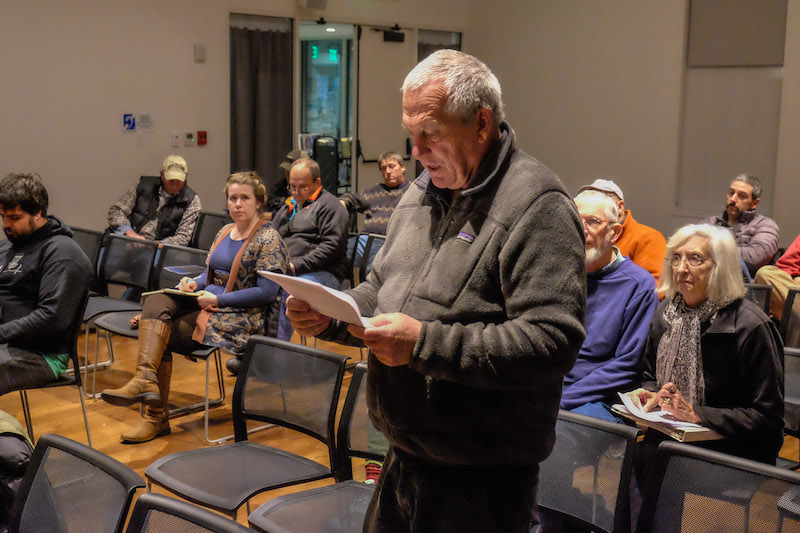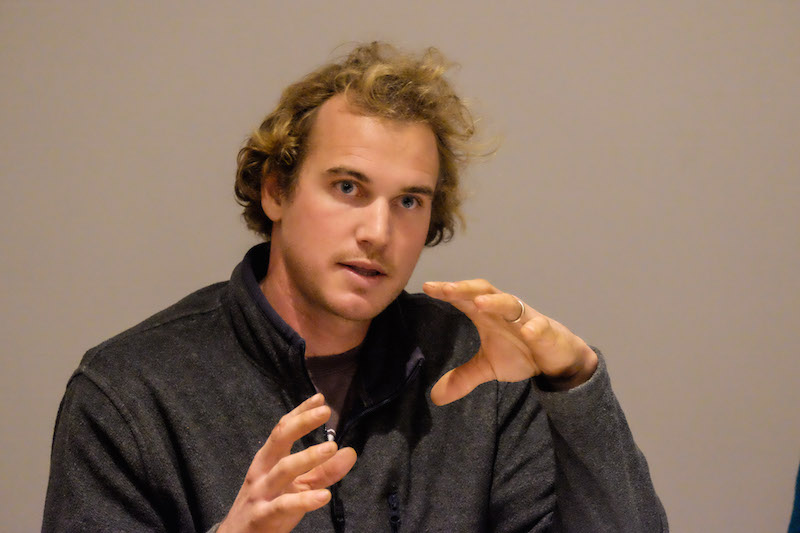The Edgartown shellfish committee will shelve for now a plan to expand oyster farms to Cape Pogue Pond, amid cross currents of opinion about protecting the pristine bay and a desire to build on the town’s thriving aquaculture industry.
At a meeting Tuesday the committee voted 2-1 with two abstentions to turn down a request from Noah Scheffer to lease an acre of the pond for oyster farming.
“I feel like aquaculture is a positive thing that the town should be looking at,” said committee member Nic Turner, an oyster farmer in Katama Bay. “I do have concerns that this is maybe not the correct location.”

Committee chairman Christian Thornton agreed, and suggested taking a wider look at the issue. “Being in favor of aquaculture and wanting to see some growth, I wonder, as a committee, do we look at a comprehensive plan,” he said.
Mr. Thornton and Mr. Turner voted against the request from Mr. Scheffer. Committee member Les Baynes voted in favor of the proposal. Madeline Fisher and Ryan Smith recused themselves from the vote because they have family members on the wait list for oyster farms.
The committee also voted 3-0 to collaborate with other departments on a comprehensive plan for oyster farming in Edgartown.
It was the second meeting in two weeks to discuss the proposal. A public hearing two weeks ago drew a small crowd with heated opinions, including from conch and bay scallop fishermen who had concerns the plan could affect their livelihoods. Others said they were concerned about how the farms would affect the pristine pond. Mr. Scheffer and his wife Lauren said they hoped to join other Vineyarders who had turned to oyster farming to make a living on the Vineyard.
The concerns were renewed at Tuesday’s public hearing, which was attended by about 20 people. Most, including harbor master Charlie Blair, said they strongly opposed the proposed location.
“My vision for the future is that my grandchildren and their kids will visit Cape Pogue and see it as it is now . . . the most pristine pond you’ll ever find in your lives,” Mr. Blair said. “It’s the last place, don’t screw it up.”
He added that he had concerns about vessel navigation in the bay, and how the farms would look. “Katama Bay doesn’t set a good visual,” he said. “If you do that to Cape Pogue you’re out of your minds.”
The town conservation commission wrote a letter to the shellfish committee stating concerns about how private aquaculture grants would affect habitat for eel grass, scallops and other benthic organisms.

“I just don’t like seeing the public use being taken away for a commercial enterprise which is what it boils down to,” Chappaquiddick resident Bill Gazaille said.
Others said they support aquaculture but called for caution and a wider view. “With the successful trend of oyster farming it will be beneficial to the town to work toward a long-term management plan,” Edgartown resident Patrick Courtney wrote in a letter read into the record. “It is very possible that in the future oyster farming will be proposed for any place with water than can support them.”
He said the wild and rare habitat of Cape Pogue Pond makes it unique on the Island. “Aquaculture growth is very important, as is the need to protect the ecosystem that makes our Island so unique,” he wrote.
Brice Contessa, a charter fishing boat captain, said oyster pond grants at Cape Pogue would be“premature and misguided.”
“It is incumbent on us as a town to usher in this transition in a mindful, sensible and informed manner,” he said.
“If in fact Edgartown decides that expanding the fixed shellfish fishery is a good idea, the town should undertake a town wide survey or overview of potential places this might happen in a sustainable way,” Chappaquiddick resident Sidney Morris said. “We’re not doing it in a comprehensive way, just responding to one instance, and it’s causing all kinds of conflict.”
Katama Bay is home to a dozen thriving oyster farms, the maximum allowed. There is a wait list for available leases.
The proposal would have required approval from town selectmen and the state. Mr. Scheffer can still bring his proposal before selectmen directly.
Shellfish constable Paul Bagnall said the process is driven by interest in oyster farming in certain areas. “I could go around the town and show you all the muddy bottom but if nobody wants to apply for it it’s quite a bit of expense/time on my part to hold a hearing,” he said.
Committee member Les Baynes was steadfast in his support for the proposal, saying he was in favor of letting Mr. Scheffer move forward even if the committee did not approve the eight-lease plan.
“I think that’s a fair thing. This thing takes time. Selectmen can stop him, the state can stop him,” he said. “For me I think history says it’s worked. I think that as a community it has worked . . . we have history now. We should look to our young people in the future.”
Mr. Turner offered his own view.
“I feel like aquaculture has been given a negative light in these discussion,” he said. “I see it as people working hard, making a living producing good quality food. I understand the pristine view and wanting to preserve that . . . when I look at yachts and multi-million dollar mansions, that’s not beauty for me. I’d much rather look at an oyster raft with local people working on it.”








Comments (7)
Comments
Comment policy »